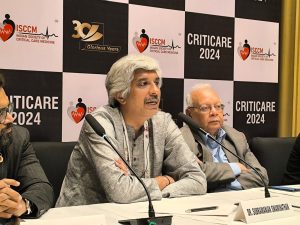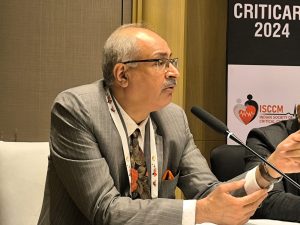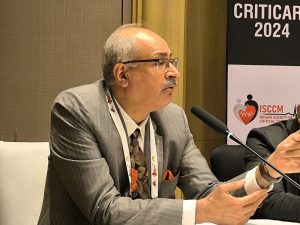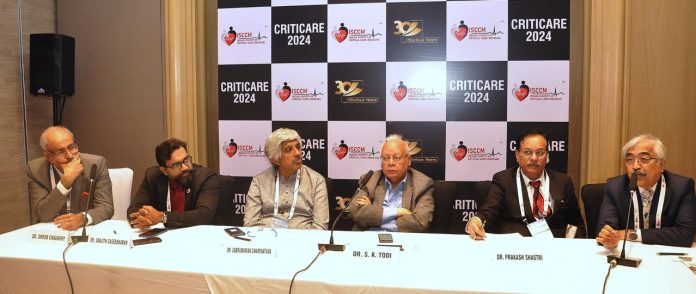News Hungama:
Kolkata, 2nd March 2024: With an intent to raise awareness and educate people around the condition ‘Anti-microbial resistance’ and the public health problems related to it, Indian Society of Critical Care Medicine (ISCCM) joined hands with the nation’s leading doctors to organise a conference to share their insights on the prevailing condition in India.

Antimicrobial resistance occurs when germs like bacteria and fungi develop the ability to defeat the drugs pinned to kill them, resulting in their growth. Resistant infections can be difficult, and sometimes impossible, to treat. One of the major reasons causing this is the inappropriate usage of antimicrobials, and sometimes inadequate diagnosis. It’s imperative for healthcare providers to prescribe antimicrobials appropriately, and not get overwhelmed with insistent patients. Additionally, understanding the increasing need to prevent hospital-acquired infections that lead to such conditions is paramount. Public Private Partnership (PPP) model in the healthcare industry can possibly check the incidence of this as it helps in ensuring that the medical infrastructure is leveraged at best through optimum utilization. Raising awareness among the public on the use and abuse of antibiotics can be the first step in bringing a sustainable change in behaviour.

Calling attention to the global public health threat, that has directly killed nearly 3 lac people in India, including newborns in 2019 alone, leading doctors like Dr. S K Todi, Dr. Prakash Shastri, Dr. Subramanian Swaminathan, Dr. Sanjith Saseedharan, Dr. Dhruva Chaudhry, and Dr. Ajoy Sarkar broke the ice around the myth that antibiotics can treat everything without any side-effects.
Dr. S K Todi, Co-chairperson, Scientific Committee, Criticare, said “India has been in the frontline because of the increasing resistance to antibiotics. We are seeing patients coming from different communities with drug resistant infection. Where previously few drugs like ampicillin used to work, now they are not working. So, it’s a very grave concern where people are dying because of inappropriate usage of antibiotic dosage. And India is now looked at as the epicentre of this disease. Hence, we’ve gathered here, so we can convey this message to the audience that half of the infections are viral which do not require antibiotic. Unfortunately, we do not have a stringent regulation in our country to impede the dissemination of antibiotics without prescriptions, but the government is taking strict actions on this.”

Dr. Prakash Shastri, Critical care Specialist, Sri Gangaram Hospital, Delhi stated “It’s because of the availability of these antibiotics in the counters in India, that the proper usage of these are not taken care of. For instance, I had a mother coming into my chamber with her son who had fever, to whom I had just prescribed paracetamol. She was really not happy with my diagnosis and doubted my judgment. So, I think the patients are also very much willing to take medicines without even knowing what has happened to them. Recently it was published somewhere that water supply of Delhi has very serious bacteria which do not respond to commonly used antibiotics, and since this new and novel resistance mechanism was found in Delhi, it was named as New Delhi mechanism. But it’s not okay to name such a serious disease and blame India as the originator of it just because it’s found here. So I think again the responsibility is everyone’s at the end of the day to gain knowledge on such severe conditions and not spread word without knowing.”
Dr. Subramanian Swaminathan, Director, Infectious Disease, Gleneagles Hospital, Chennai said, “None of us take cancer, cholesterol or BP medicine because we don’t feel nice, but we have a tendency to take antibiotics if we fall minorly ill. That is the starting point which is very dangerous. Our fear of falling severely ill somehow makes us feel that by taking antibiotics for minor sickness will solve our issue, and not cause us any trouble, but it does. The key solution to such fears is knowledge. A record list states by 2050 drug resistant bacteria is going to take down more people than cancer and it is going to be a catastrophe because of the cost. These antibiotics are designed for a purpose, and we should respect that. The starting point is to understand if at all these medications are going to cure us or is it just to put a halt to our fear. It’s time people realise that antibiotics are not the answer for every problem. Unless and until it is required, patients should be content with not having these antibiotics. And without all stakeholders working that includes the government, physicians, pharmaceuticals and most importantly the society, this issue cannot be resolved.”
Dr. Sanjith Saseedharan, Head, Critical care department, SL Raheja Hospital, Mumbai said, “Antibiotic has now become an anti-anxiety medicine. We have observed that when some parents bring their child to an outpatient clinic for general paediatric treatment, they often ask why the doctor did not prescribe an antibiotic and that is a fearful incident. I strongly feel it’s time doctors should discuss with his patients that element of risk associated with antibiotic dosage. So, I remember this a while ago, there were no antibiotics and people were dying and now we have millions of antibiotics, though no people are dying but this has occurred that we may not get any treatment left. We have gone back to a condition where even if someone falls somewhere or get their knees scratched, they will probably require a very heavy dose of antibiotic and this is what is occurring as of now, and we would have nothing to save people as time goes. After conducting a study in our hospital where we did culture of stool specimens of people who were coming for normal things like angiography, we found large number of infectious resistance organisms in those stool samples which Todi sir was referring to. This is now a community problem, and we feel this is disastrous. So, in this hall if there are 100 people, 30 of you have this mechanism that means if tomorrow if your immunity goes down it is these bacteria which might cause the problem. Yes, we are moving from an anti-biotic era to pre antibiotic era, and it looks like we have nothing to fight in this battle provided if the right measures are not adhered to.”
Dr. Dhruva Chaudhry Sr. Professor & Head, Department of Pulmonary Medicine, Pt. B. D. Sharma, PGIMS, Rohtak, said “It’s equally important that the public must understand the severity of the issue. We get people who have running nose, or sore throat with a cough who come up saying they have had azithromycin and it is not responding. So, people should act responsibly, and they must not take antibiotics without prescription. We also need to have a behaviour which is conducive with personal health as well as the public health. This message needs to be sent out to all that the privilege in terms of the modern medicine and longevity that we have now, if we want to enjoy it fully, then we should be preserving it.”
Dr. Ajoy Sarkar, Consultant physician and Specialist in Respiratory & Critical Care Medicine, Peerless Hospital & B K Roy Research Centre, Kolkata stated “We should take antibiotics rationally, responsibly and not abuse the intake of such medicines. Before 1940, we never really had antibiotics. Alexander Fleming invented the penicillin post which the society has been drowning in antibiotics just like water in the sea. In every other corner you’ll find these antibiotics, but hardly any will work in the near future, leading us back to the pre-antibiotic era.”
About us: Indian Society of Critical Care Medicine was established on 9th October, 1993, in Mumbai. It is the largest non-profit association of Indian Physicians, Nurses, Physiotherapists and other allied health care professionals involved in the care of the critically ill. ISCCM which was started with a small group of consultants, from Mumbai, is now having membership of 17,137, comprising of 98 city branches & 2 state branches all across the India with headquarter at Mumbai.
The ISCCM aims to achieve its objectives by: Imparting educational training by developing and running Post-graduate fellowship courses and diplomas in the field of critical care medicine; Setting up research projects in the field of critical care across the country; Formulating standards and guidelines for the organization and practice of intensive care to suit Indian conditions; Organizing national and international congresses and meetings; Providing basic training in intensive care for non-specialists; To seek affiliations and collaborations with national and international organizations of similar interests to achieve the objectives of the society.


